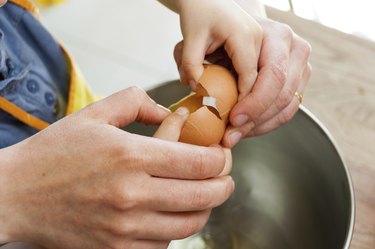
People often take for granted how dangerous day-to-day activities can be. For example, baking involves chemistry, high heat and bacteria that can cause serious food-borne illness. Losing your concentration or focus for one second may lead to burns or fires. While a little common sense goes a long way to ensure baking safety, certain strategies you might not have considered may make your kitchen adventures much more safe.
Equipment Check
Video of the Day
Equipment safety lies at the heart of all baking success. Your oven should work properly and heat to the correct temperature. It also needs to stay clean. Spills on the bottom of the oven can catch fire, so check for them and clean them up before and after you bake. In addition to a clean oven, you need a clean refrigerator. A dirty refrigerator can contaminate eggs, milk, butter and other cold items with mold and bacteria. Home Food Safety recommends washing down all inside and outside surfaces with hot, soapy water on a regular basis. Throw away old food, clean up any spills right away and do a full cleaning monthly.
Video of the Day
Kitchen Consciousness
The National Fire Protection Association stresses the importance of your physical presence in the kitchen. Leaving the room while you're baking leads to opportunities for fires to start and spread unchecked. If you're in the kitchen preparing several different baked goods at once, set timers to remind you to stop and check on cooking items. If you're cooking something in the oven that could bubble over, place it on top of a sheet pan to catch any spills so you don't have to constantly monitor it.
Gadget Mastery
A tiny accident with a gadget or appliance could yield disastrous results. Make sure you understand all the operating instructions for everything from your food processor to your blender. Make sure all the parts are in good working order. Check to make sure your mixer and attachments won't fall off or break off in your dough or batter. If you're using a mixer or immersion blender in a hot custard or filling, start on a very slow setting and gradually increase speed to prevent splash burns.
Fire Safety
Keep a fire extinguisher handy to help manage a small fire in your home. If you're making custards or other stove-top items, keep the pot lid nearby. If a small fire erupts, place the lid on the pot to suffocate the fire. If a larger fire starts or a smaller fire spreads, immediately call 911, even if you're confident you can put it out yourself. Kitchen fires can spread out of control quickly. If you lose control of a fire, do not stay behind to try to extinguish it. Get out of the house immediately and call the fire department.
Egg Safety
Eggs hold cookies and crusts together and create the base for custards and meringues. Eggs, however, have the potential to cause serious illness if they are not cooked to the proper temperature. Foodsafety.gov recommends cooking eggs to 160 degrees Fahrenheit. If you can't reliably take the food's temperature, such as in a pie crust, make sure the food is cooked at about 350 degrees F for at least 15 minutes. Skip eating raw cookie dough or taste-testing raw batters. If you want to create a no-bake item with eggs, use pasteurized liquid or powdered egg substitutes. Wash your hands and thoroughly clean all food-prep surfaces.